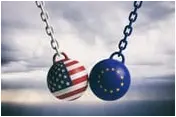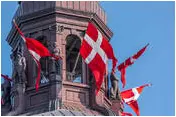The Year Of The European Union Linux Desktop May Finally Arrive
Opinion Microsoft, tactically admitting it has failed at talking all the Windows 10 PC users into moving to Windows 11 after all, is – sort of, kind of – extending Windows 10 support for another year.
For most users, that means they’ll need to subscribe to Microsoft 365. This, in turn, means their data and meta-information will be kept in a US-based datacenter. That isn’t sitting so well with many European Union (EU) organizations and companies. It doesn’t sit that well with me or a lot of other people either.
A few years back, I wrote in these very pages that Microsoft didn’t want you so much to buy Windows as subscribe to its cloud services and keep your data on its servers. If you wanted a real desktop operating system, Linux would be almost your only choice.
Nothing has changed since then, except that folks are getting a wee bit more concerned about their privacy now that President Donald Trump is in charge of the US. You may have noticed that he and his regime love getting their hands on other people’s data.
Privacy isn’t the only issue. Can you trust Microsoft to deliver on its service promises under American political pressure? Ask the EU-based International Criminal Court (ICC) which after it issued arrest warrants for Israeli Prime Minister Benjamin Netanyahu for war crimes, Trump imposed sanctions on the ICC. Soon afterward, ICC’s chief prosecutor, Karim Khan, was reportedly locked out of his Microsoft email accounts. Coincidence? Some think not. Microsoft denies they had anything to do with this.
Peter Ganten, chairman of the German-based Open-Source Business Alliance (OSBA), opined that these sanctions ordered by the US which he alleged had been implemented by Microsoft “must be a wake-up call for all those responsible for the secure availability of state and private IT and communication infrastructures.”
Microsoft chairman and general counsel, Brad Smith, had promised that it would stand behind its EU customers against political pressure. In the aftermath of the ICC reports, Smith declared Microsoft had not been “in any way [involved in] the cessation of services to the ICC.” In the meantime, if you want to reach Khan, you’ll find him on the privacy-first Swiss email provider, ProtonMail.
In short, besides all the other good reasons for people switching to the Linux desktop – security, Linux is now easy to use, and, thanks to Steam, you can do serious gaming on Linux – privacy has become much more critical. That’s why several EU governments have decided that moving to the Linux desktop makes a lot of sense.
Of course, there’s nothing new about this per se. Back in 2004, when you had to be a serious Linux desktop fan to use it, Munich started its Linux desktop LiMux project, which lasted until 2017. Oddly, this move came after Munich’s city leaders were pleased to announce in 2016 that Microsoft was moving its German headquarters to town. Funny that, eh?
Even so, Linux and open source software are still alive and kicking in the Bavarian capital city. Munich established an Open Source Program Office in 2024 to coordinate and promote open-source activities across the city administration. You can’t keep a good operating system down.
In the meantime, France’s gendarmerie successfully switched to Ubuntu Linux over a decade ago. Today, 97 percent of its workstations, over 103,000 computers, are running GendBuntu, the Gendarmerie’s custom Ubuntu-based Linux distribution. This project is being actively maintained and updated. They’re now running GendBuntu 24.04 LTS. Elsewhere in France, it emerged this week that the city of Lyon is abandoning the Office suite in favor of Linux and PostgreSQL.
Others in Europe have proposed a European-organization-specific Linux, EU OS. This would be based on the immutable Fedora KDE Linux desktop, Kinoite. Yeah, I know, I know, Fedora? The US-based Red Hat community distro? Yep. Might I suggest that if there’s going to be an EU-based official Linux desktop they might look to Linux Mint, my personal favorite desktop, which is headed by French developer Clement “Clem” Lefebvre,” or openSUSE? I’m just saying!
More recently, Denmark decided it has had enough Windows and Office and is dumping them for Linux and LibreOffice. A desire for digital sovereignty is driving this. Denmark wants to control its data and not have a kill switch in the White House or Redmond for all its software.
This move had been coming for a while. Denmark’s largest cities, Copenhagen and Aarhus, had already announced plans to kiss Microsoft goodbye. As Henrik Appel Espersen, chairman of the Copenhagen Audit Committee, said, “If we suddenly can’t send emails or communicate internally because of a political fallout, that’s a huge problem.” You think?
The Danes aren’t alone. Bart Groothuis, a Dutch European Parliament member, has said that the EU “should go for a European cloud” since “Europe has a ‘problem’ with the American cloud.”
Oh, and by the way, the German state of Schleswig-Holstein is also bidding all Microsoft software adieu. Why? Digitalization Minister Dirk Schrödter declared that the government had “no influence on the operating processes of such [proprietary] solutions and the handling of data, including a possible data outflow to third countries. As a state, we have a great responsibility towards our citizens and companies to ensure that their data is kept safe with us, and we must ensure that we are always in control of the IT solutions we use and that we can act independently as a state.”
Makes sense to me.
Besides, all these governments know that switching from Windows 10 to 11 isn’t cheap. While finances also play a role, and I always believe in “following the money” when it comes to such software decisions, there’s no question that Europe is worried about just how trustworthy America and its companies are these days. Do you blame them? I don’t. ®
A considerable amount of time and effort goes into maintaining this website, creating backend automation and creating new features and content for you to make actionable intelligence decisions. Everyone that supports the site helps enable new functionality.
If you like the site, please support us on “Patreon” or “Buy Me A Coffee” using the buttons below
To keep up to date follow us on the below channels.




